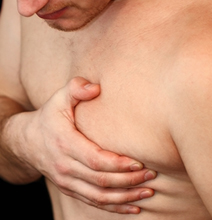Gynecomastia
It is the most common benign change of the male breast and is caused by hormonal imbalance. Fibroademones and breast cysts, which are also benign and common in women, are rare in men.
Men with gynecomastia develop a growth, in the shape of a disk or a button, under the nipple or the areola.
The change can be palpable and easily seen.
Despite being common and benign, because of its apparent similarity to breast cancer – both are a growth under the nipple – it should always be looked at and then followed by your doctor to guarantee the correct diagnosis.
Gynecomastia is not a tumor, simply a growth of the breast tissue.
Due to result from hormonal imbalance, it is more common among teenagers but it can also affect older men.
Exceptionally it can be caused by conditions that increase estrogen levels in the body such as:
- Tumors or illnesses that affect the endocrine glands;
- Diseases that affect the liver;
- Extreme obesity.
Gynecomastia can also be caused by some medication - for example treatments for ulcers or heartburn, high blood pressure or heart failure – or result from the rare “Klinefelter syndrome”.
Despite gynecomastia's symptoms being similar to those of breast cancer, there is no evidence that it can increase breast cancer risk. The exception being in the case of the Klinefelter syndrome, which can be linked to breast cancer.


